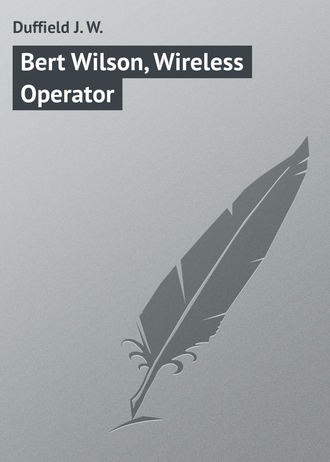 полная версия
полная версияBert Wilson, Wireless Operator
“How far off do you suppose it is now?” asked Tom.
“Not more than fifteen miles, I should think,” answered Bert. “We’ll be there in less than an hour now, if we can keep up this pace.”
The Fearless flew on, steadily cutting down the distance, and now the sky was the color of blood. Everything had been gotten in readiness for the work of rescue. The boats had been cleared and hung in their davits, ready to be lowered in a trice. Lines of hose were prepared, not so much with the hope of putting out the fire as to protect their own vessel from the flying brands. Every man of the crew was at his appointed place. Since the wireless could no longer be used to send messages of encouragement, rockets were sent up at intervals to tell the unfortunates that help was coming.
“Look!” cried Tom. “That was an actual flash I saw that time.”
Gradually these became more frequent, and now the upper part of the vessel came into view, wreathed in smoke and flame. Soon the hull appeared, and then they could get a clear idea of the catastrophe.
The whole forward part of the vessel was a seething mass of fire. The engines had been put out of commission, and the hull wallowed helplessly at the mercy of the waves. The officers and crew, fighting to the last, had been crowded aft, and the stern was black with passengers huddled despairingly together. The supply of boats had been insufficient, and two of these had been smashed in lowering. Two others, packed to the guards, had been pushed away from the vessel, so as not to be set on fire by the brands that fell in showers all around. Near the stern, some of the sailors were hastily trying to improvise a raft with spars and casks. They were working with superhuman energy, but, hampered as they were by the frantic passengers, could make but little progress. And all the time the pitiless flames were coming nearer and nearer, greedily licking up everything that disputed their advance. It was a scene of anguish and of panic such as had never been dreamed of by the breathless spectators who crowded the bow of the Fearless, as it swiftly swept into the zone of light and prepared to lower its boats.
Suddenly there was a great commotion visible on the flaming ship. They had seen their rescuers. Men shouted and pointed wildly; women screamed and fell on their knees in thanksgiving. The boats already in the water gave way and made for the Fearless. The sailors stopped work upon the raft, now no longer needed, and turned to with the officers who were striving desperately to keep the more frenzied passengers from plunging headlong into the sea and swimming to the steamer. Their last refuge in the stern had grown pitifully small now, and the flames, gathering volume as they advanced, rushed toward them as though determined not to be balked of the prey that had seemed so surely in their grasp.
It was a moment for quick action, and Captain Manning rose to the occasion. In obedience to his sharp word of command, the sailors tumbled into the boats, and these were dropped so smartly that they seemed to hit the water together. Out went the oars and away they pulled with all the strength and practised skill of their sinewy arms. Bert and Dick were permitted to go as volunteers in the boat of Mr. Collins, the first mate, who had given his consent with some reluctance, as he had little faith in any but regular sailors in cases of this kind; and his boat was the first to reach the vessel and round to under the stern.
“Women and children first,” the unwritten law of the sea, was strictly enforced, and they were lowered one by one, until the boat sat so low in the water that Mr. Collins ordered his crew to back away and let the next one take its place. Just as it got under way, a woman holding a baby in her arms, frantic with fright as she saw the boat leaving, broke away from the restraining hand of a sailor, and leaped from the stern. She missed the gig, which was fortunate, as she would certainly have capsized it, heavily laden as it already was, and fell into the water. In an instant Bert, who could swim like a fish, had plunged in and grabbed her as she rose to the surface. A few strokes of the oars and they were hauled aboard, and the boat made for the ship. Collins, a taciturn man, looked his approval but said nothing at the time, although, in a talk with the captain afterwards, he went so far as to revise his opinion of volunteers and to admit that an able seaman could have done no better.
The rest of the passengers were quickly taken off and then came the turn of the officers and crew. The captain was the last to leave the devoted vessel, and it was with a warm grasp of sympathy and understanding that Captain Manning greeted him as he came over the side. He was worn with the strain and shaken with emotion. He had done all that a man could do to save his ship, but fate had been too strong for him and he had to bow to the inevitable. He refused to go below and take some refreshment, but stood with knitted brows and folded arms watching the burning steamer that had carried his hopes and fortunes. They respected his grief and left him alone for a time, while they made arrangements for the homeless passengers and crew.
These were forlorn enough. They had saved practically no baggage and only the most cherished of their personal belongings. Some had been badly burned in their efforts to subdue the flames, and all were at the breaking point from excitement and fatigue. The doctors of both ships were taxed to the utmost, administering sedatives and tonics and dressing the wounds of the injured. By this time the passengers of the Fearless had, of course, been roused by the tumult, and men and women alike vied with each other in aiding the unfortunates. Cabins and staterooms were prepared for the passengers, while quarters in the forecastle were provided for the crew who, with the proverbial stolidity and fatalism of their kind, soon made themselves at home, taking the whole thing as a matter of course. They had just been at hand-grips with death; but this had occurred to them so often that they regarded it simply as an incident of their calling.
There was no thought of sleep for Bert that night. The sounder crashed and the blue flames leaped for hours in the wireless room. The operator of the Caledonian volunteered to help him, but Bert wouldn’t hear of it and sent him to his bunk, where, after the terrific strain, he was soon in the sleep of utter exhaustion.
Then Bert called up the San Francisco station and told his story. The owners of the ship were notified that the vessel and cargo were a total loss, but that all the passengers had been saved. They sent their thanks to Captain Manning and then wirelessed for details. Mr. Quinby, of course, was called into the conference. Now that it was settled that no lives had been lost, the most important question was as to the disposition of passengers and crew. They had been making for San Francisco, but naturally it was out of the question for the Fearless to relinquish her voyage and take them into port.
Three courses were open. They could go to Hawaii, the first stopping place, and there take the first steamer leaving for San Francisco. Or they could depend on the chance of meeting some vessel homeward bound, to which they could transship before reaching Honolulu. Or Bert could send his call abroad through his wireless zone and perhaps arrange for some ship coming toward them to sail along a certain course, meet them at a given location and there take charge of the Caledonian’s people. In that case, the owners, of course, would expect to recompense them handsomely for their time and trouble.
As the survivors were desperately anxious to reach home and friends at the earliest possible moment, Bert was instructed to follow the latter course and do his utmost to raise some approaching vessel. For a long time his efforts were fruitless. His call flew over the ocean wastes but awoke no answering echo. At last, however, well toward morning, his eager ear caught a responsive click. It came from the Nippon, one of the trans-Pacific liners plying between Yokohama and San Francisco. She was less than four hundred miles away and coming on a line slightly east of the Fearless. The situation was explained, and after the captains of the two steamers had carried on a long conversation, it was agreed that the Nippon should take charge of the survivors. They would probably meet late that afternoon, and arrangements were made to keep each other informed hourly of pace and direction, until they should come in sight.
Bert breathed a huge sigh of relief when that question was settled. But his work was not yet done. He must notify the United States Government of the presence of the derelict as a menace to navigation. The Caledonian had lost all its upper works and part of the hull had been consumed. But the waves breaking over it as it lurched from side to side had kept it from burning to the water’s edge, and it now tossed about, a helpless hulk right in the lane of ships. So many vessels have been lost by coming in collision with such floating wrecks at night, that the Government maintains a special line of gunboats, whose one duty is to search them out and blow them up with dynamite. Bert gave the exact latitude and longitude to the San Francisco operator, who promised to forward it at once to the Navy Department at Washington.
Then, at last, Bert leaned back in his chair and relaxed. The strain upon heart and nerve and brain had been tremendous. But he had “stood the gaff.” The first great test had been nobly met. Cool, clever, self-reliant, he had not flinched or wavered under the load of responsibility. The emergency had challenged him and he had mastered it. In this work, so new to him, he had kept his courage and borne himself as a veteran of the key.
He patted the key affectionately. Good old wireless! How many parts it had played that night and how well! Telling first of pain and terror and begging for help; then cheerily sending hope and comfort and promise of salvation. Without it, the dawn would now be breaking on two small boats and a flimsy raft, crowded with miserable refugees and tossing up and down on the gray waves that threatened to engulf. Now they were safe, thank God, warm and snug and secure, soon to be called to the abundant breakfast, whose savory odors already assailed his nostrils. And now the whole world knew of the disaster and the rescue; and the machinery of the Government was moving with reference to that abandoned hulk; and a great ship was bounding toward them over the trackless waste to meet at a given place and time and take the survivors back to country and home and friends and love and life. It was wonderful, mysterious, unbelievable —
A touch upon his shoulder roused him from his reverie, and he looked up, to see the captain standing beside him.
“You’ve done great work this night, Wilson,” he said, smiling gravely, “and I’ll see that the owners hear of it. But now you must be dead tired, and I want you to get your breakfast and turn in for a while. I’ll get Howland, the wireless man of the Caledonian, to hold things down for a few hours, while you get a rest. I’ve told the cook to get a bite ready for you and then I want you to tumble in.”
The “bite” resolved itself into a capacious meal of steak and eggs, reinforced by fragrant coffee, after which, obeying orders, he rolled into his bunk and at once fell into deep and dreamless sleep.
Meanwhile, the ship awoke to the life of a new day. The sun streamed down from cloudless skies and a spanking breeze blew over the quarter. The air was like wine and to breathe it was an inspiration. The sea smiled and dimpled as its myriad waves reflected back the glorious light. The Fearless slipped through the long swells as swiftly as a water sprite, “footing it featly” on her road to Hawaii, the Paradise of the Pacific. Everything spoke of life and buoyancy, and the terrible events of the night before might well have been a frightful nightmare from which they had happily awakened.
There were grim reminders, however, that it had been more than a dream in the hurrying doctors, the bandaged hands and faces, the haggard features of the men and the semi-hysterical condition of some of the women. But there had been no death or mortal injury. The Red Death had gazed upon them with its flaming eyes and scorched them with its baleful breath, but they had not been consumed. There were property losses, but no wife had been snatched from her husband, no mother wailed for her child. Under the comforting influence of a hot breakfast, the heartfelt sympathy of the passengers and the invigorating air and sunshine, they gradually grew more cheerful. After all, they were alive, snatched by a miracle from a hideous death; and how could or dared they complain of minor ills? The tension relaxed as the hours wore on, and by the time that Bert, after a most refreshing sleep, appeared again on deck the scene was one of animation and almost gaiety.
Straight to the wireless room he went, to be met on the threshold by Dick and Tom and Ralph, who gathered around him in tumultuous greeting.
“Bully for you, old man,” cried Dick. “We hear that you did yourself proud last night.”
“Yes,” chimed in Ralph. “I wouldn’t dare to tell you what Father says in a message I’ve just received, or you’d have a swelled head, sure.”
“Nonsense,” answered Bert. “I simply did what it was up to me to do. Good morning, Mr. Howland,” he said, as the young fellow seated at the key rose to greet him. “How are things going?”
“Just jogging along,” answered Howland. “I guess you cleaned up about everything before you turned in. We’re getting beyond the shore range, but I’ve been keeping in touch every hour with the Nippon. The captain figures that we’ll get together at about four this afternoon.”
The former operator of the Caledonian was a well set-up, clear-eyed young fellow, about the age of Bert and his chums, and a liking sprang up between them at once. With the recuperative power of youth he had almost entirely recovered from the events of the night before, although his singed hair and eyebrows bore eloquent testimony to the perils he had faced and so narrowly escaped. He had stuck to his post until the blistering heat had made life impossible in the wireless room, and then had done yeoman’s work in aiding the officers and crew to fight the fire and maintain order among the passengers. The boys listened with keenest interest, while he went over in graphic style his personal experiences.
“I can’t tell you how I felt when I got your message,” he said, as he turned to Bert. “I had about given up hope when your answer came. I rushed at once to the captain and he passed the word to the passengers and crew. It put new heart and life into them all, and it was the only thing that kept many from jumping into the sea when the flames got so horribly near. But they held on desperately, and when they saw your rockets I wish you could have heard the cry that went up. They knew then that it was only a matter of minutes before your boats would be under the stern. But it was fearfully close figuring,” he went on, soberly. “You saw yourself that fifteen minutes after the last boat pulled away the whole stern was a mass of flames.”
“Well,” said Bert, as he slipped on the receiver, and took charge of the key, “it’s lucky that I got your call just when I did. A little later and I’d have been off duty.”
“That reminds me,” broke in Ralph. “I sent a message to Father to-day about that, urging that you have an assistant to take charge when you are at meals or in bed. I suggested, too, that since Mr. Howland was here, he might be willing to go on with us and act as your assistant. He says he is agreeable if they want him to, and I expect a wireless from Father to the captain authorizing him to make the arrangement.”
“I hope he will,” said Bert, warmly. “Accidents have an awkward way of happening just when they ought not to, and when one thinks of the life and property at stake it certainly seems that somebody should be on the job all the time.”
A little later the looked-for message came instructing Captain Manning to engage Howland as Bert’s deputy during the voyage. From now on, there would not be one moment of the twenty-four hours that someone would not be on watch to send or receive, much to Bert’s relief and delight. Now he could breathe freely and enjoy his work, without any torturing fears of what might have happened while he slept.
By half-past three that afternoon the ships were within twenty miles of each other. The beautiful weather still continued and the sea was as “calm as a millpond.” All were on the alert to greet the oncoming steamer. Soon a dot appeared, growing rapidly larger until it resolved itself into a magnificent steamer, seven hundred feet in length, with towering masts and deck piled on deck, crowded with dense masses of people. She made a stately picture as she came on until a quarter of a mile from the Fearless. Then she hove to and lowered her boats.
With deep emotion and the warmest thanks, the survivors bade their rescuers good-by and were carried over to the Nippon, their third temporary home within twenty-four hours. By the time the last boat had unloaded and been swung on board, dusk had fallen. The ships squared away on their separate courses and the bells in the engine room signaled full speed ahead. Handkerchiefs waved and whistles tooted as they passed each other, and the white-coated band on the upper deck of the Nippon played “Home Again.” The electric lights were suddenly turned on and the great ship glowed in beauty from stem to stern. They watched her as she drew swiftly away, until her gleaming lights became tiny diamonds on the horizon’s rim and then faded into the night.
CHAPTER V
An Island Paradise
“Land ho!” shouted the look-out from his airy perch in the crow’s nest, and with one accord the passengers of the Fearless rushed on deck to catch the first glimpse of that wonderful land they had all heard so much about. Hawaii! What a vision of hill and plain, of mountain and valley, of dangerous precipice and treacherous canyon, of sandy beach and waving palm, of radiant sunshine and brilliant moonlight, the magic of that name evokes!
“Gee, fellows, can you see anything that looks like land?” Bert asked of his companions, as they elbowed their way through the crowd to the railing of the ship. “Oh, yes, there it is,” he cried a moment later, pointing to a tiny spot on the horizon, “but it looks as if it were hundreds of miles away.”
“It sure does,” Dick agreed. “If this atmosphere were not so remarkably clear, we wouldn’t be able to see it at all. It doesn’t matter how far away it is, though, as long as it’s in sight. For the last few days it has seemed to me that we would never reach it,” and he gazed longingly at the speck on the horizon that seemed to be dissolving into two or three smaller parts that became more distinct every moment.
“Yes, I can’t wait to try the little old ‘Gray Ghost’ on some of those swell Hawaiian roads. Say, fellows, can’t you just imagine yourselves in the old car; can’t you feel the throb of the motor and the whistling of the wind in your ears as she takes a steep hill with a ‘give me something hard, won’t you’ air? Can’t you?” he demanded, joyfully, while the boys thrilled at the mere prospect.
“You bet your life,” Tom agreed, enthusiastically. “Make believe we won’t make things hum in little old Hawaii, eh, fellows?” and they all laughed from sheer delight.
“Glad to find you in such good spirits this fine morning, boys,” came a genial voice behind them and the boys turned to find the doctor regarding them with a good-natured smile on his friendly face. “I don’t wonder you feel good at the prospect of setting foot on solid ground again. For, no matter how enjoyable and prosperous the voyage may be, one is always glad to get on shore and feel that he may come and go when he pleases and is not at the mercy of the elements. I for one will be glad when we cast anchor.”
“I have always heard that Hawaii was one of the most beautiful countries in the world, and I’ve always wanted to see it,” said Bert. “What do you think of it, Doctor? You must have been here many times.”
Dr. Hamilton took two or three long puffs of his cigar before he answered, reflectively, “It has always seemed to me that when Nature discovered Hawaii she had some time on her hands that she didn’t know what to do with, so she spent it in making this obscure little group of islands way out in the Pacific, the garden spot of the world. Over those islands the wind never blows too roughly or too coldly, the sun never shines too brightly and there is no snow to blight and kill the vegetation that warm rain and summer sun have called forth. Over there the grass is greener, the sky bluer and the scenery more beautiful than it is in any other part of the world. If you should take everything that you consider beautiful, multiply it by one hundred and put them in one small portion of the earth, you would have some idea of what Hawaii is like.”
The boys were struck by the outburst.
“Hawaii is the doctor’s favorite hobby,” Ralph said, in response to the look of astonishment and wonder on the boys’ faces. “If he had his way, he’d live here all the year round.”
“That I would,” said the doctor, with a sigh, “but my profession claims me first, last and all the time. However,” he added, with his cheerful smile, “I want you boys to make the most of the few days we are to spend here, to have the time of your lives. The only thing I ask of you is that you don’t run the ‘Gray Ghost’ over the side of a precipice or seek to inquire too closely into the mysteries of the firepit, Halemaumau. I’ll have to leave you, as I have some important matters to attend to before I can enjoy the beauties of Hawaii. Coming, Bert? Yes, I shouldn’t wonder if we would be getting some wireless messages very soon.”
The three companions watched Bert and the doctor until they disappeared down the companion-way and then turned once more to the islands.
After a moment of silence Tom said, “Say, if Hawaii is all the doctor says it is, Ralph, we ought to have some fun. Imagine driving the machine along a precipice and visiting fire-pits with outlandish names. What was it he called it?”
“Halemaumau,” Ralph answered. “It is a jaw-breaker, isn’t it, but I’ve heard Dad talk so much about Hawaiian wonders that I’ve got the name down pat. You see Halemaumau means ‘House of Everlasting Fire,’ and it’s the name of the fire-pit of the crater, Kilauea. There, don’t you think I’ve mastered the subject and learned my lesson well?”
“You have, indeed, my son,” Dick said, assuming his best grandfatherly air. “If you continue on the road you have begun you will make a success of your life.”
“Say, fellows,” Tom broke in. “Stop your nonsense and look at what you’re coming to. I’m beginning to think that Dr. Hamilton didn’t exaggerate, after all. Just look at that line of beach with the cliffs behind it, forming a dark background for the white of the buildings. And what are those funny, bobbing things in the water? I suppose they must be boats of some sort, but they don’t look like anything I ever saw.”
“I guess they must be the boats of the native money divers.”
“Money divers!” Tom exclaimed. “Where do they get the money?”
“We give it to them,” said Dick. “I remember reading about how passengers throw their perfectly good money into the water just for the fun of seeing those little grafters pick it up. A waste of good money I call it.”
“Gee, I’m going into the business,” Tom affirmed. “Just give me a diving costume and I bet you couldn’t tell me from the natives.”
“You needn’t count on annexing any of my hard-earned cash, because you won’t get it. I’d be more likely to throw a dynamite bomb in just as you were getting ready to dive,” Dick said.
“I know you would, you old skinflint. The only thing is that you would be just as likely as I to get blown up. I guess you left that out of your calculations, didn’t you?”
“What’s all this about dynamite bombs and getting blown up?” Bert asked, coming up behind them. “It sounds rather bloodthirsty.”
“Oh, he’s just threatening my very valuable life,” Tom answered, “but I forgive him, for he’s not responsible for what he says. To change the subject, what are you doing up here when you ought to be taking down wireless messages?”








